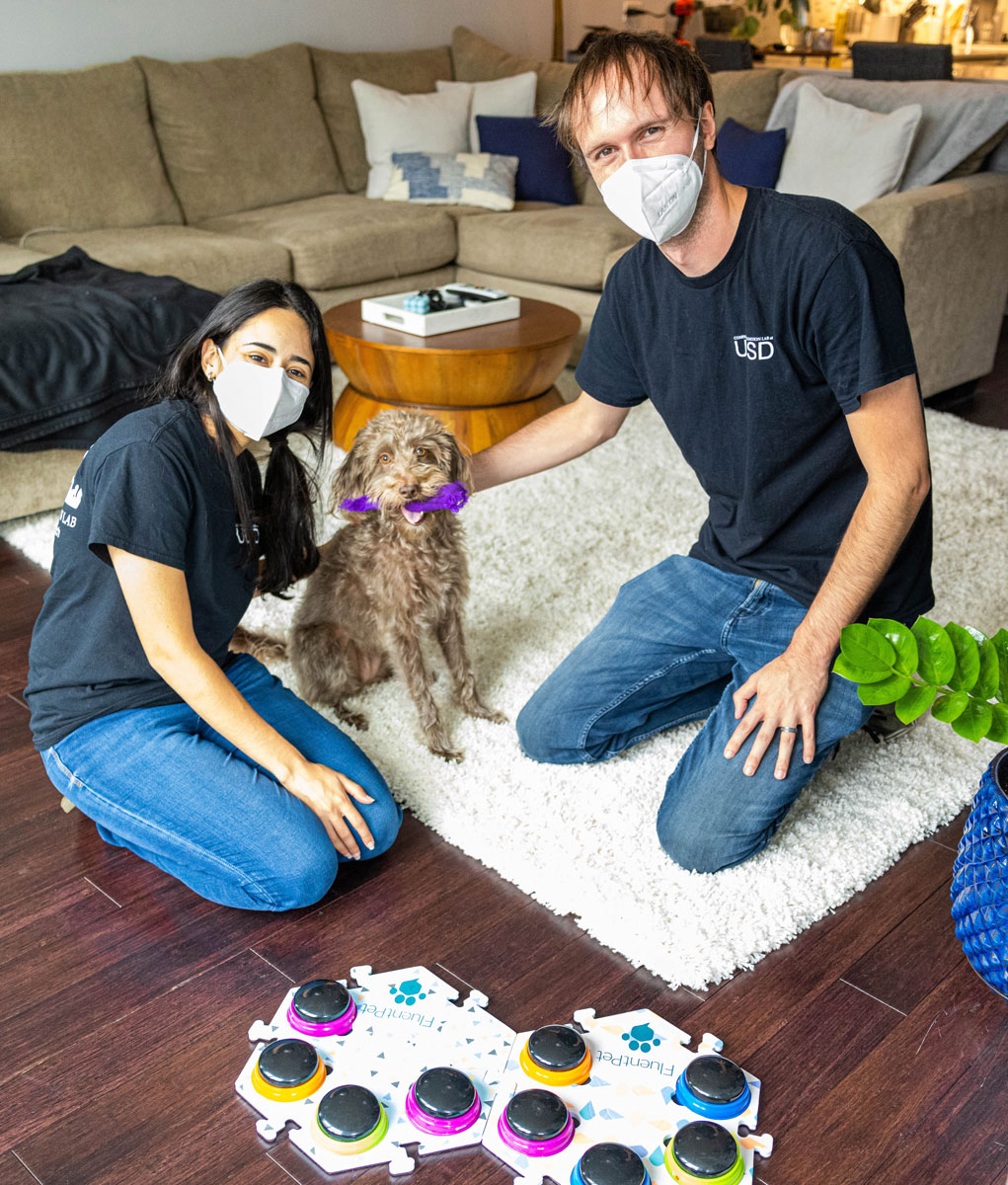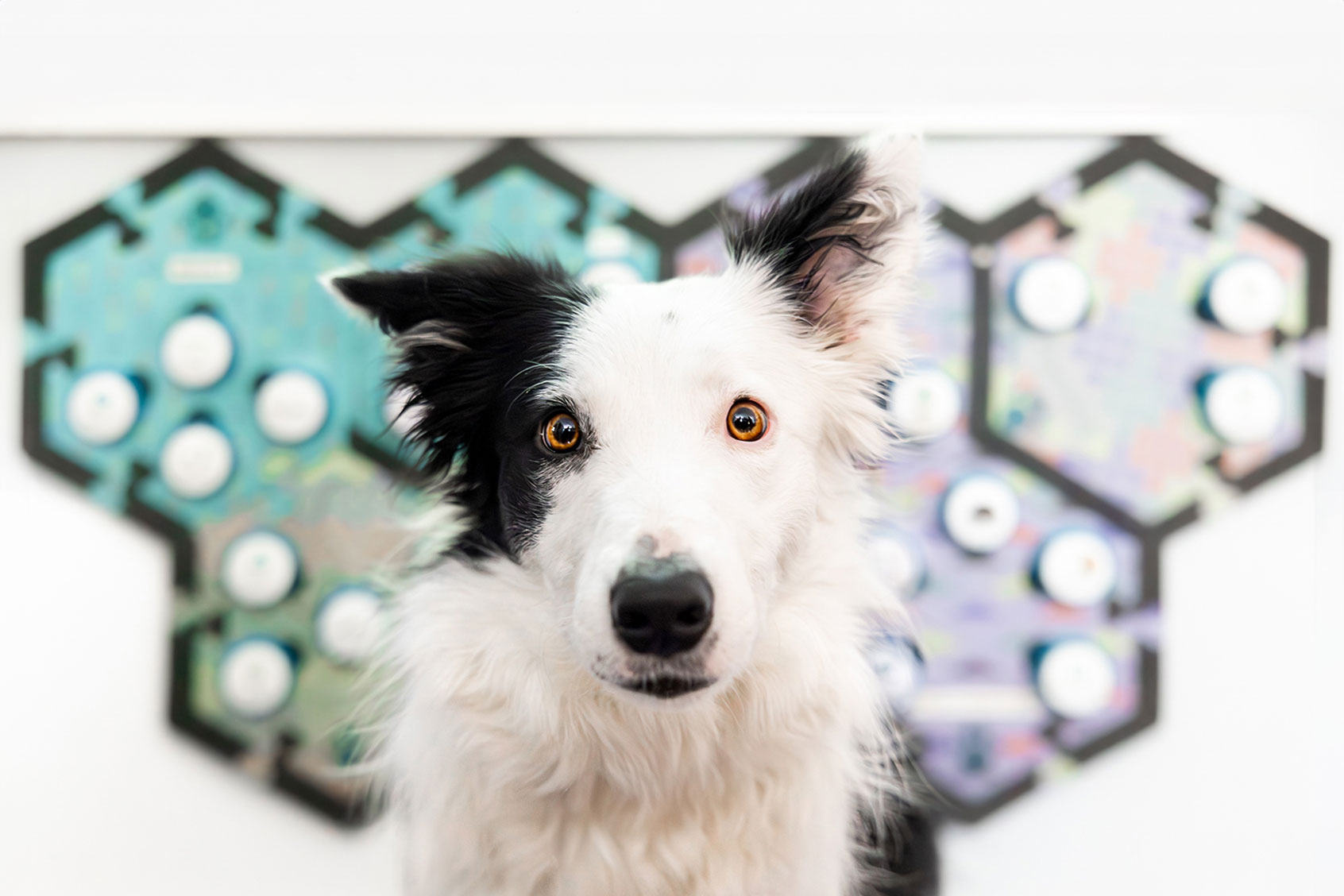Bunny, TikTok's beloved "talking" Sheepadoodle, never fails to amaze her millions of followers. From asking for play dates with dog friends on her augmentative and alternative communication (AAC) device to posing existential questions and reporting her dreams, it appears that the more Bunny talks, the more insight we gain into the minds of dogs. But a question has always lingered: how much does she really understand? What is learned behavior and what is Bunny's understanding?
Understandably, there have been skeptics believing that dogs who use soundboards don’t understand the words they’re using, but instead are responding to cues from their owners. However, a new study published in PLOS One by researchers from the University of California, San Diego, and other institutions, concluded that dogs do understand words and use soundboard buttons to produce appropriate responses.
“What we can show now is that, at the very least for the participants in this study, is that the dog seems to be paying attention to the words and not with any kind of behavioral cueing from the experimenter,” Federico Rossano, associate professor in the Department of Cognitive Science at the University of California–San Diego and co-author of the study, told Salon. “This is reassuring because it shows that it's not simply a matter of Clever Hans [a fake animal intelligence stunt] effect, and this a good first step towards assessing how far the animals are learning words and what kind of use they can make of them.”
The study consisted of two experiments. In the first, researchers went to the homes of 30 dogs across the country to test their responses to soundboard buttons. In this experiment, the researcher placed the dog in a location of the house other than where the soundboard was located. Once the dog was out of sight, one researcher placed three large colored stickers over three buttons containing one of each of the words of interest — such as “eat,” “outside,” “toy” or “play.” A second researcher, unaware of which button was which and unable to hear the words they produced, pressed one of these buttons and recorded the dog’s behavior.
In the second experiment, the dogs’ owners conducted a similar analysis on their own, but switched between pressing one of the buttons or saying the word themselves.
 Amalia Bastos and Patrick Wood with dog study subject (Courtesy of Comparative Cognition Lab at UC San Diego)
Amalia Bastos and Patrick Wood with dog study subject (Courtesy of Comparative Cognition Lab at UC San Diego)
The results found that dogs were seven times more likely to display play-related behavior when the play/toy button was pressed compared to the other buttons being pressed. The dogs didn't exhibit food-related behaviors in response to relevant words, but as the authors note, "this may have occurred because several of the dogs taking part in the study may have been satiated before the start of test trials, or because dogs did not expect that they would be served a meal outside of their usual feeding times."
“Our study suggests that dogs were more likely to perform play-related behaviors after an experimenter or their owner produced a play-related word, and were more likely to exhibit outside-related behaviors in response to an experimenter or their owner producing an outside-related word,” the researchers wrote in the study. “This demonstrates that dogs are, at the very least, capable of learning an association between these words or buttons and their outcomes in the world.”
"This demonstrates that dogs are, at the very least, capable of learning an association between these words or buttons and their outcomes in the world."
The researchers elaborated that their results “demonstrate that dogs’ contextually appropriate responses to button presses were comparable regardless of the identity of the person using the soundboard.”
In other words, they have some sort of comprehension. Rossano said this is a critical first step to move on to more insightful research.
Want more health and science stories in your inbox? Subscribe to Salon's weekly newsletter Lab Notes.
“We have papers under review that look at how intentionally they seem to be using these buttons,” Rossano said. “How do they seem to combine them, whether, when confronted with a certain situation, they seem to select the appropriate button to request for help, for example.”
When asked if this study will put public skepticism to rest, Rossano said such skepticism is a normal part of science.
“All I can tell you is, the reviewers we have for this paper said we appreciate you pre-registered the study,” he said. “We can see that you've done it thoroughly, and you have controlled for a bunch of things, and so while we're not surprised by the finding, it's good that you did it and you did it the right way.”
We need your help to stay independent
Overall, the goal of these studies and the use of the soundboard, Rossano said, is to help dog owners understand their pets better. For example, if a dog can tell you they are in pain, there could be immense benefit to the dog’s well-being.
“Ideally, this training helps us understand our dogs better, opens a little window into their cognitive ability and their minds,” he said. “And by being able to learn more about what they're thinking, what they care about, or what they're going through, hopefully we can better care for them.”


